Why Does Red Bull Cause a Non-Negative Result for Methamphetamine in Urine Drug Screens?
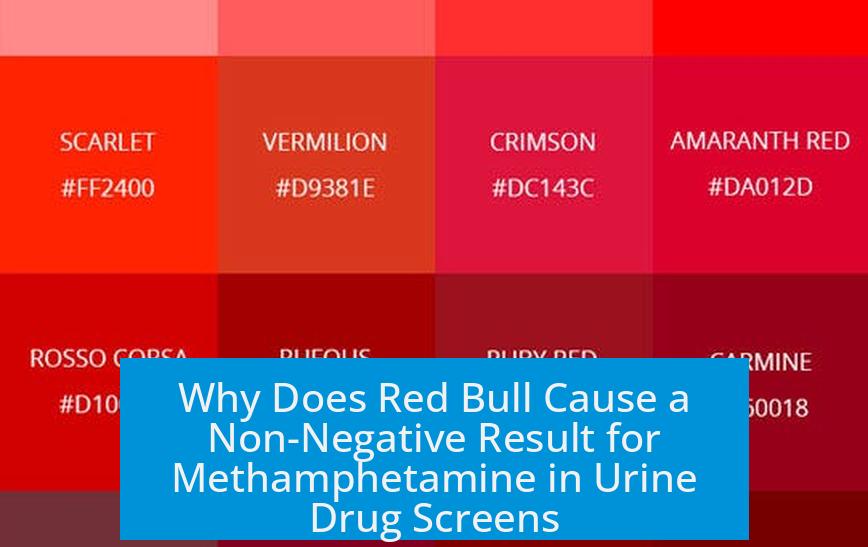
Red Bull can produce a false positive or non-negative result for methamphetamine in urine drug screen tests due to antibody cross-reactivity, assay interference from its ingredients, and the improper use of urine test kits with non-urine samples.
Understanding Urine Drug Screening Assays
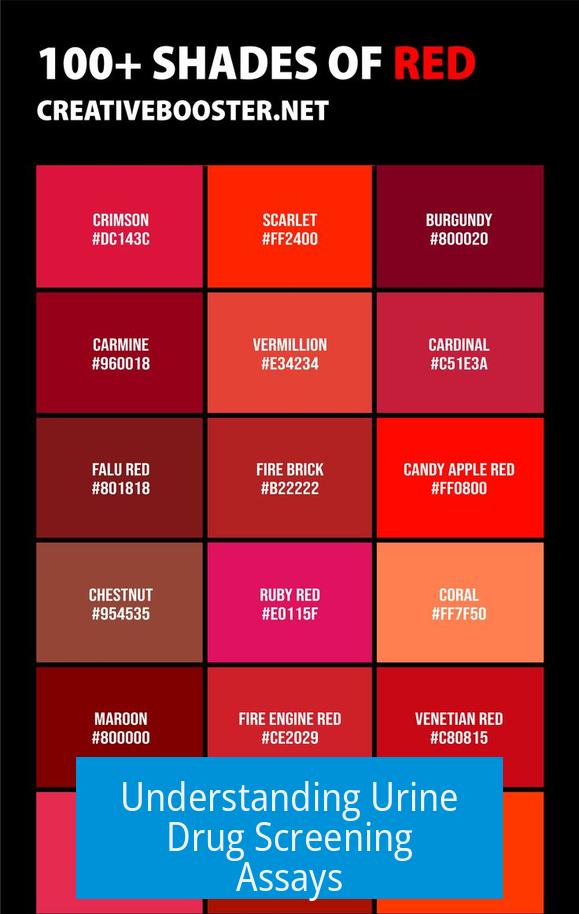
Urine drug screens typically detect metabolites—breakdown products formed by the body after drug ingestion—rather than the original compounds. These assays rely on antibodies designed to bind specific drug metabolites to produce a positive signal.
The specificity of these antibody-based tests is limited. Antibodies can bind to chemically similar molecules, causing cross-reactivity. In other words, a substance with a structure resembling methamphetamine might be mistaken for the drug in the assay, leading to a false positive or non-negative result.
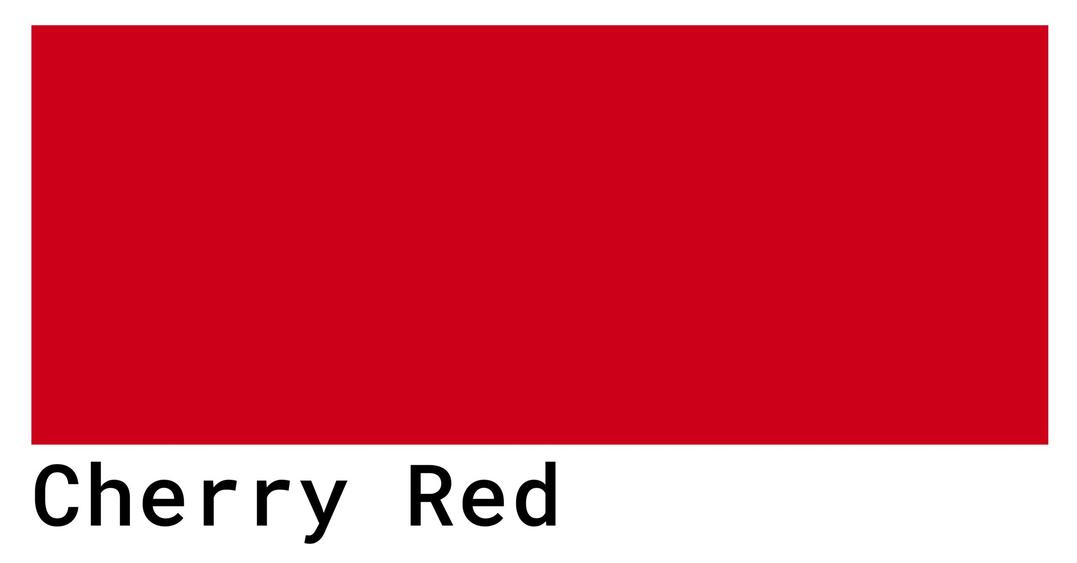
Antibody Cross-Reactivity and Red Bull Ingredients
Red Bull contains various compounds, such as caffeine, taurine, and sugars, as well as ingredients that may share certain structural features with amphetamine-like molecules. This similarity can cause the antibodies in some urine drug screen kits to bind these compounds mistakenly.

For instance:
- Caffeine and its Metabolites: While caffeine is structurally distinct, its metabolites might unintentionally cross-react.
- Other Stimulants: Although Red Bull does not contain methamphetamine, some of the stimulants present may share epitopes that antibodies recognize.
- Sugars and Acidity: The low pH and high sugar concentration in Red Bull can influence the assay environment, affecting antibody binding and signal detection.
This antibody cross-reactivity is a known limitation of immunoassays and can explain why consuming Red Bull, especially in large quantities, might trigger a non-negative methamphetamine result.

Limitations of Using Urine Drug Test Kits for Non-Urine Samples
Urine drug screens are validated and calibrated for human urine, a complex fluid containing specific proteins, salts, and metabolites. Using Red Bull or any non-urine liquid in these tests invalidates the results.

Red Bull lacks the chemical matrix of urine necessary for accurate antibody-antigen interactions. Without the correct sample matrix:
- The assay’s baseline and controls are disrupted.
- False positives or negatives become more likely due to nonspecific binding or test artifacts.
- The test cannot reliably quantify or identify metabolites of illicit drugs.
Therefore, testing pure Red Bull in a urine drug screen does not yield meaningful drug detection data.
Anecdotal Evidence and Confirmatory Testing
Cases have been reported where individuals who consumed significant amounts of Red Bull tested positive or non-negative for amphetamines or cocaine in urine drug screens administered at hospitals. These individuals often deny illicit drug use, and confirmatory tests, such as gas chromatography-mass spectrometry (GC-MS), typically return negative results.
This pattern supports the interpretation that initial immunoassay screening may generate false positives linked to Red Bull components, but specific confirmatory methods do not detect actual methamphetamine or cocaine use.
Scientific and Industry Perspective on Methamphetamine in Red Bull
There is no credible evidence to support claims that Red Bull or similar energy drinks contain methamphetamine or related illicit substances. Methamphetamine manufacture is complex and closely controlled due to its high abuse potential.
Inserting illegal stimulants into commercial drinks would present major legal and operational risks for manufacturers. The theory that compounds mimicking methamphetamine effects in drug tests are present in Red Bull is likely a misunderstanding of chemical cross-reactivity and test limitations rather than a reflection of the product’s actual ingredients.
Other Factors Contributing to False Positives
The following elements may also contribute to assay interference:
- High acidity (low pH) of Red Bull affecting antibody binding.
- High sugar content altering test chemistry or viscosity.
- Other proprietary additives potentially sharing epitopes with amphetamines.
No definitive study identifies the exact chemical responsible for interference, but these factors are probable contributors.
Summary Table: Reasons for Red Bull Causing a Non-Negative on Methamphetamine Urine Tests
| Factor | Description | Impact on Urine Test |
|---|---|---|
| Antibody Cross-Reactivity | Antibodies bind similar molecules in Red Bull. | Generates false positives for methamphetamine. |
| Assay Interference | Acidity, sugars affect test chemistry. | Distorts antibody binding and signal. |
| Non-Urine Sample Use | Testing Red Bull directly with urine tests. | Invalid and unreliable results. |
| Absence of Confirmatory Testing | Lack of GC-MS or other specific methods. | Cannot definitively confirm methamphetamine. |
Best Practices for Drug Screening and Energy Drink Consumption
For accurate drug screening results, only properly collected human urine samples should be tested using validated assays. Energy drink consumption prior to testing should be disclosed, as certain ingredients may cause initial test interference.
If an initial screening returns a positive or non-negative for methamphetamine or related substances, confirmatory testing with specific analytical techniques (GC-MS, LC-MS/MS) is essential to rule out false positives.
Health professionals and testing facilities should be aware of potential interference from common beverages and advise patients accordingly.
Key Takeaways
- Urine drug screens primarily detect drug metabolites, not the drug itself.
- Antibody-based immunoassays can cross-react with compounds in Red Bull, causing false positives for methamphetamine.
- Testing Red Bull in urine drug screen kits is inappropriate and yields unreliable results.
- Anecdotal reports show positive screenings after heavy Red Bull consumption, but confirmatory tests typically negate illegal drug presence.
- No scientific evidence supports methamphetamine being an ingredient in Red Bull.
- Factors like acidity and sugar concentration may contribute to assay interference.
- Confirmatory testing is crucial to distinguish true drug use from false positives.
Why Does Red Bull Test “Non-Negative” for Methamphetamine in a Urine Drug Screen?
So, what happens if you gulp down a can of Red Bull and then take a urine drug screen, which suddenly flags you for methamphetamine? The short answer: it’s very likely a false positive caused by how these tests work and the ingredients in Red Bull that confuse the assay.
Now let’s dive into why this odd mix-up can happen and what you need to know about urine drug screenings and Red Bull’s chemistry. Strap in — it’s more intriguing than your average energy drink tale.
How Urine Drug Screens Really Work
Urine drug tests don’t just look for the drug itself. They usually check for metabolites — that’s what the body breaks the drug down into after you swallow it. This is important because sometimes these metabolites share chemical features with other substances. So, a test designed to detect methamphetamine metabolites might get tricked by chemically similar stuff.
Think of it like a facial recognition app that confuses a sibling for you. The antibodies in the test kits bind to molecules based on shape and structure, but they aren’t perfect snobs. If something “looks like” methamphetamine at the molecular level, the test’s antibodies might latch onto it anyway.
What’s Really Inside Red Bull That Causes Trouble?
Red Bull’s secret ingredients include caffeine, taurine, sugars, and a splash of B vitamins—not methamphetamine, no matter what conspiracy theories float around the web. However, some natural or synthetic compounds in Red Bull have structures that can resemble amphetamine compounds closely enough to fool an antibody in an immunoassay test.
Alongside this, the environment of the sample itself — factors like low pH and a high sugar concentration — can jumble the antibody binding. In plain English, Red Bull’s acidity and sweetener levels may screw with the test’s ability to distinguish friend from foe. So it’s not that Red Bull contains methamphetamine; it’s just that something in it looks like it under the test’s microscope.
Do People Actually Test Positive After Just Drinking Red Bull?
Believe it or not, yes. Here’s a real-life story: a patient who drank about five large cans of Red Bull daily ended up flagged positive for amphetamines at a hospital. Naturally, the patient was baffled and insisted they took no illegal drugs. The hospital ran a confirmatory test — usually a more accurate method like GC-MS (gas chromatography-mass spectrometry) — and it came back clean. The initial result was a false flag.
That’s why medical and forensic experts often recommend confirmatory testing before drawing conclusions or legal actions. The initial immunoassay screening is fast and cheap but can be faulty.
Why Testing Red Bull in a Urine Drug Test Kit Doesn’t Make Sense
Some might think: if I test Red Bull directly in a urine drug screen kit, will it show as positive for meth? The answer is a big NO. These kits are designed specifically for human urine samples. Using Red Bull’s liquid instead is like using a thermometer to weigh your luggage — it just doesn’t work. The test’s chemistry expects urine’s properties and compounds. Introducing a sugary energy drink throws everything off and gives meaningless results.
So, if anyone is running Red Bull through a urine test instead of actual urine, they are misusing the test and need a crash course in lab science.
Addressing the Rumors About Methamphetamines in Red Bull
Okay, the internet loves a good conspiracy. Some claim Red Bull contains methamphetamines to block melatonin and keep you awake. That’s pure speculation and not grounded in any scientific or regulatory evidence. Methamphetamine is illegal, controlled, expensive, and would bring massive legal action against any beverage company.
Why would an energy drink company risk that? The usual answer is simple: they don’t need methamphetamine to wake you up. Caffeine and taurine do the job just fine—and without breaking laws or courts.
A Quick Recap: What Can Trigger a False Positive?
- Immunoassay antibodies cross-reacting with compounds in Red Bull that look like amphetamines.
- High acidity and sugar content interfering with the assay’s chemical environment.
- Using the wrong sample (Red Bull instead of urine) to run the test.
- Absence of methamphetamine in Red Bull—rumors aren’t facts.
What Should You Do If This Happens to You?
If you drink Red Bull or other sodas frequently and face a non-negative result for methamphetamine on a urine screen, don’t panic. Ask for confirmatory testing like GC-MS or LC-MS/MS, which distinguish real drug metabolites from imposters.
Also, disclose your energy drink consumption upfront. Medical staff or employers might find that useful when interpreting your results.
Is This Problem Unique to Red Bull?
Good question! Some people wonder if soda or other caffeinated drinks cause similar false positives. While Red Bull gets the spotlight because of its popularity, any drink with similar components (artificial sweeteners, caffeine, taurine) could potentially interfere. But to date, Red Bull seems the main suspect due to its specific formulation and high taurine content.
Testing this theory would be an intriguing research project for curious chemists. Could a cola or generic energy drink trigger a similar response? Possibly, but less documented.
Final Thoughts
False positives on urine drug screens aren’t uncommon, especially with complex beverages like Red Bull in play. The science is straightforward: immunoassays look for molecules that “fit” their antibodies. Red Bull contains cousin molecules that get mistaken for methamphetamine.
Before believing headlines or rumors about methamphetamines in Red Bull, remember: science and confirmatory testing set the record straight.
So next time you crack open an energy drink before a drug test, remember this cautionary tale. It’s probably safe — but maybe not foolproof for your drug test results!
Why did Red Bull cause a non-negative result for Methamphetamine in a urine drug screen?
Red Bull contains compounds that can mimic amphetamines in antibody-based drug tests. These tests can cross-react with similar substances, leading to false positives.
Can a urine drug test accurately detect methamphetamine in a non-urine sample like Red Bull?
No. Urine drug screens are designed for human urine. Testing Red Bull or other liquids not meant for the assay gives unreliable and meaningless results.
Is there methamphetamine actually added to Red Bull?
No reliable evidence supports that claim. Suggestions about methamphetamine in Red Bull are speculative and not confirmed by scientific data.
Can the acidity or sugar in Red Bull interfere with drug screening tests?
Yes, the low pH and high sugar content in Red Bull may affect antibody binding in the test, causing potential false positives.
Have there been cases where people tested positive for amphetamines after drinking Red Bull but were drug-free?
Yes, some individuals have tested non-negative after consuming Red Bull, but confirmatory tests such as hair follicle analysis showed no illegal substances.


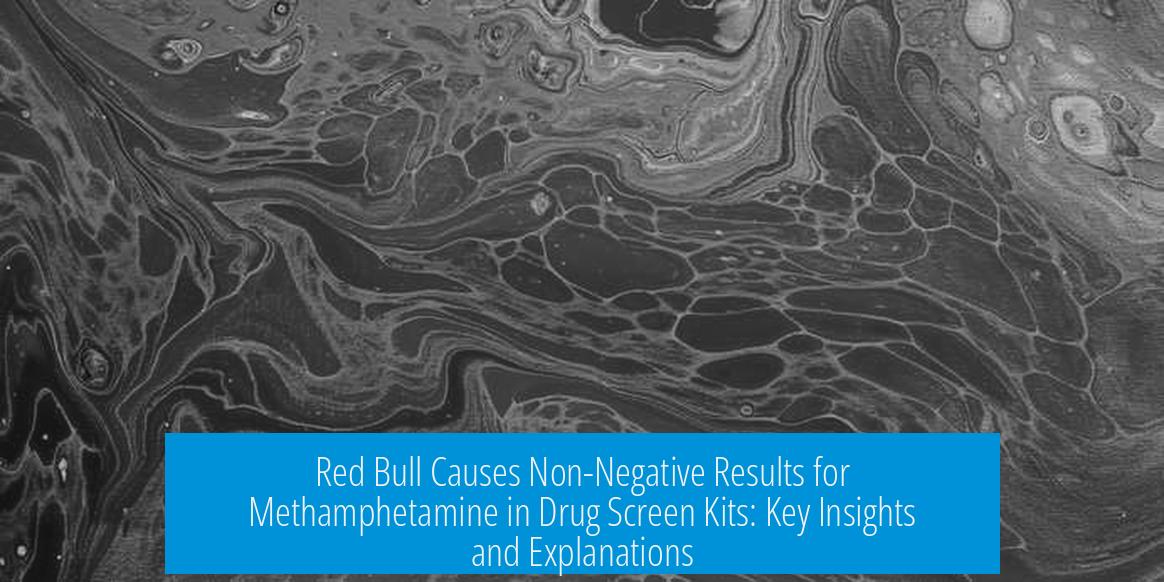

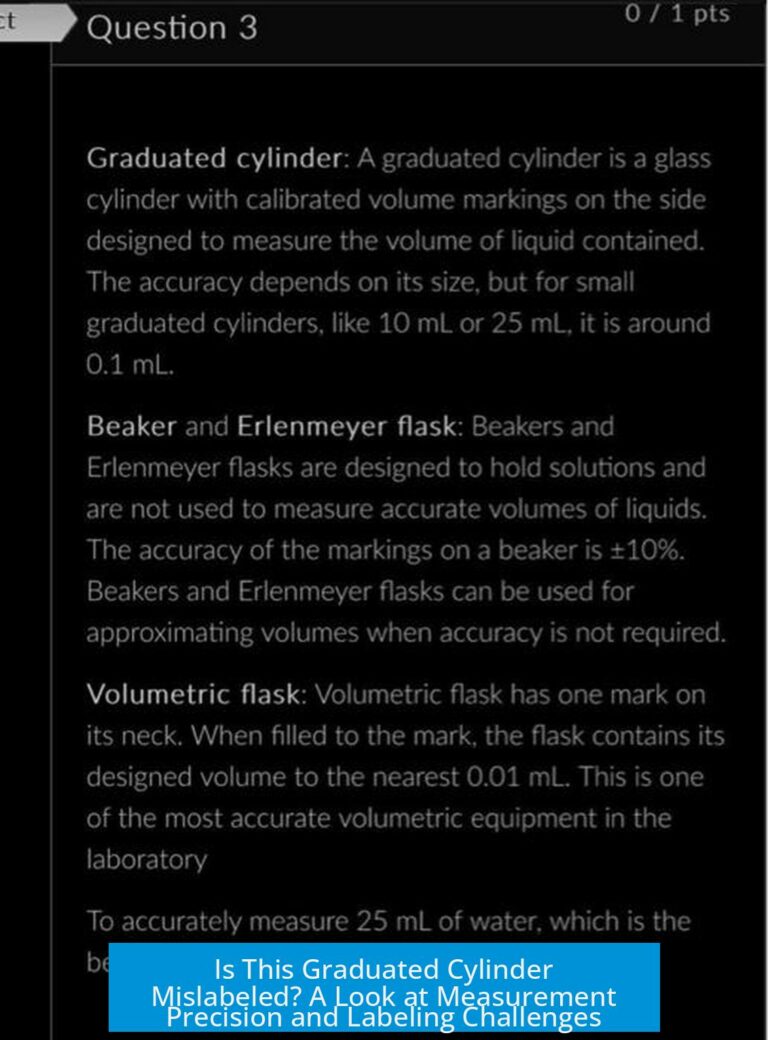
Leave a Comment